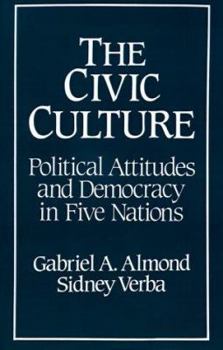The Civic Culture: Political Attitudes and Democracy in Five Nations
Select Format
Select Condition 
Book Overview
Considered a classic in the field of political science, this new edition makes its debut after twenty-five years since its first edition. Almond and Verba have presented their controversial comparative political study--conceived in the late 1950′s--where they defined and analyzed the political and social attitudes that were crucial to the successes of modern democracy in England, Germany, Italy, Mexico, and the United States. This book and its...
Format:Paperback
Language:English
ISBN:0803935587
ISBN13:9780803935587
Release Date:May 1989
Publisher:Sage Publications, Inc
Length:392 Pages
Weight:1.30 lbs.
Dimensions:1.0" x 5.6" x 8.5"
Customer Reviews
2 ratings
Civic Culture
Published by Thriftbooks.com User , 19 years ago
At the time of writing The Civic Culture (1963), Almond and Verba had observed the second wave of democratization (Huntington, 1991). As such, the authors witnessed the emergence of many new democracies. The authors knew, however, that there was more to democratic systems than simply structures and formal institutions. The authors felt that aside from the creation of democratic institutions, it was necessary that a political culture that supports democratic ideals also emerge. Almond and Verba defined this necessary cultural subtype as civic culture, a "culture based on communication and persuasion, a culture of consensus and diversity, a culture that permitted change but moderated it" (8). The purpose of The Civic Culture is to quantify the ideals and attitudes which compose the civic culture of "operating democratic systems" (11). By doing so, the authors believe that the cultural ideals necessary for a stable democracy will be readily disseminated to newly emerging democracies. In order to quantify democratic ideals, the authors undertook a comparative cross-national survey of five operating democratic systems: the US, UK, Germany, Italy and Mexico. In order to limit the research to the attitudes of individuals, the authors avoided questions about government, and rather posed inquires "about the individual's perception about government in relation to himself" (70). As testing attitudes of individuals is a complex task, the attempt to do so in a comparative fashion across five nations is especially difficult. In order to create an environment of comparability, Almond and Verba place respondents into one of three categories of political culture: parochial, subject and participant. In the parochial culture, the respondent "has neither knowledge of nor interest in politics." In the subject culture, the respondent is "at least dimly aware of politics and political symbols and institutions (and) he understands that his life is touched by government policies." Lastly, in the participant culture the respondent "has a keenly developed notion of his own political efficacy and competence as a political actor" (Walter, 1965). The three categories can combine and change. They are not mutually exclusive. Political cultures are not homogenous and each category can be subdivided into a number of cleavage groups. Almond and Verba believe that the combination between all these orientations (parochial, subject and participant "lead to a balanced political culture" (32). In order for Almond and Verba to make sense of these combinations and cleavages, they attempt to explore the differences and similarities between variables, and then compare the relative relationships of variables between nations (70). By evaluating the data collected in the five nations regarding political culture, the authors are then able to "validate inferences...and develop independent measures that can be used to explain other phenomena" (50). The next section will at
classic studies of political culture
Published by Thriftbooks.com User , 26 years ago
In their classic studies of political culture, Almond and Verba attempted to use "civic propensities" to explain the stability of governments. There method was quite groundbreaking, for comparative political scientists of those times were heavily into analyzing constitutions. But just reading these legal documents was not proving much explanation for social changes. This was the context in which their work progressed. In the opening chapter of the Civic Culture, Almond & Verba define a civic culture as "a pluralistic culture based on communication and persuasion, a culture of consensus and diversity, a culture that permitted change but moderated it" (pp. 6). For them, Britain and the United States were prime examples of such cultures. The reason was that the citizens of these countries operated in a culture with a highly effective set of orientations towards politics. These orientations include a tendency to have pride in one's government and expect good t! reatment from it. Citizens of a civic culture operate under a myth of sorts-they are not actively involved or interested in politics, but they believe that "the people" are politically powerful. There is just the right mixture of pragmatism and emotional commitment.






